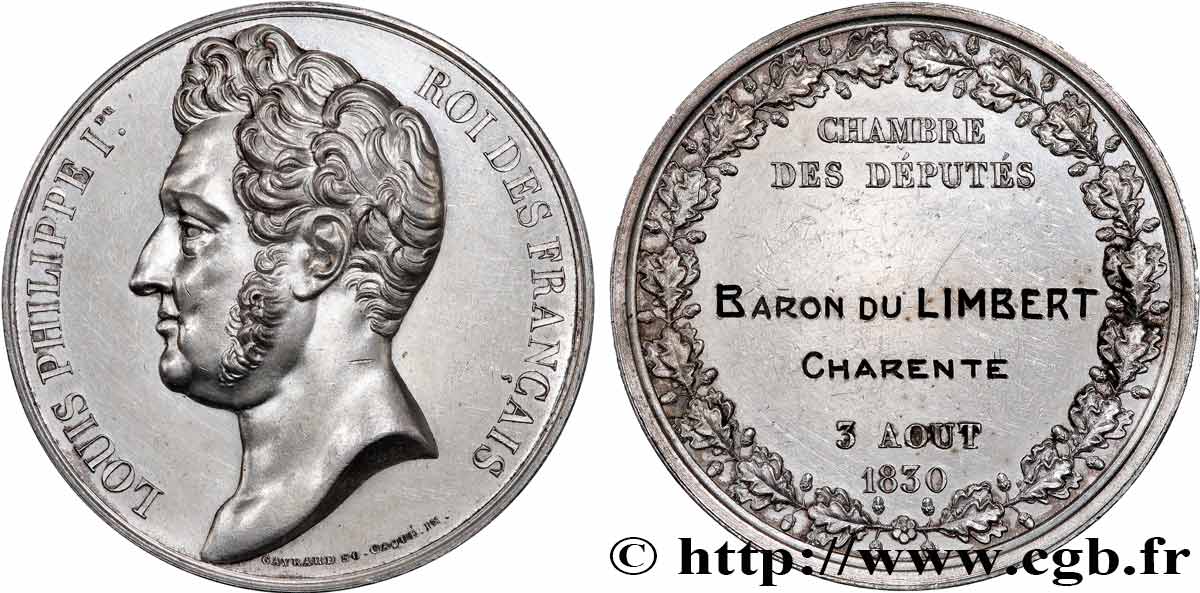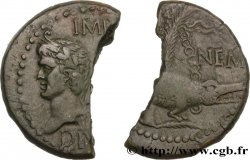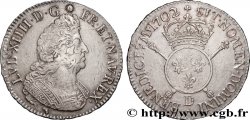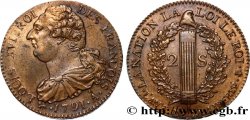Live auction - fme_781669 - LOUIS-PHILIPPE I Médaille parlementaire, François, baron Pougeard du Limbert
得先注册又得到批准才可以报价。为了报价注册. 客户应该得到公司允许,那种过程需要 48 个小时。别等出售结束那一天才登记。您报价的话等于您赞成买那物品,而且按« 保价 » 证明您接受 cgb.fr 因特网拍卖使用法.
报价时只可以出全数值欧元总额。物品描述也说明销售结束时间,结束后出价都不会生效。 报价命令转达有时变动,等到最后秒钟增加否决的可能会。想多了解的话请注意 因特网拍卖常问
最高出价方将支付18%的不含税的拍卖费用
最高出价方将支付18%的不含税的拍卖费用
| 估算 : | 200 € |
| 价格 : | 181 € |
| 最高出价 : | 181 € |
| 拍卖结束日期 : | 06 December 2022 19:32:52 |
| 竞拍人 : | 3 竞拍人 |
种类 Médaille parlementaire, François, baron Pougeard du Limbert
日期: 1830
材质 silver
直径 41,5 mm
模子方针 12 h.
硬币制模工 GAYRARD Raymond (1777-1858) / CAQUÉ Armand Auguste (1795-1881)
重量 42,38 g.
侧面 lisse
印模 sans poinçon
关于品相的说明
Bel exemplaire présentant peu d’usure. Quelques frottements dans les champs suite à un léger nettoyage, notamment au revers
正面
正面的文字 LOUIS PHILIPPE I.ER - ROI DES FRANÇAIS.
正面的说明书 Tête nue à gauche, signé : GAYRARD SC. CAQUE IN..
背面
背面的文字 CHAMBRE / DES DÉPUTÉS / BARON DU LIMBERT / CHARENTE / 5 AOUT / 1830.
背面的说明书 Légende en 6 lignes dans une couronne de chêne.
评论
Cette médaille fut décernée à François Pougeard du Limbert ou Dulimbert (1753-1837). Avocat au Parlement de Paris, sa nomination à l’Assemblée provinciale du Poitou, en août 1787, où il participe aux travaux du bureau des travaux publics, fut sa première apparition sur la scène publique.
Il est élu, le 24 mars 1789, député du Tiers de la sénéchaussée d’Angoulême. Parmi ses nombreuses fonctions, il sera membre du conseil des Anciens à partir de 1795, préfet de Haute-Vienne (1800-1802), membre du tribunat de 1802 à 1807. Préfet de l’Allier de 1807 à 1814, il sera remplacé pendant la Restauration, reviendra à son poste pendant les Cent-Jours.
Il sera élu député de la Charente du 1er octobre 1821 au 31 mai 1831. Il reçu cette médaille après sa réélection le 23 juin 1830. En 1830 il vote contre les mesures réclamées par les ultraroyalistes, et approuve l’adresse des 221, prenant ainsi part au processus menant à l’établissement de la monarchie de Juillet.
Il sera finalement président du conseil général de Charente (1831-1832).
This medal was awarded to François Pougeard du Limbert or Dulimbert (1753-1837). A lawyer at the Parliament of Paris, his appointment to the Provincial Assembly of Poitou in August 1787, where he participated in the work of the public works office, was his first appearance on the public stage. He was elected, on March 24, 1789, deputy of the Third Estate of the Seneschal of Angoulême. Among his many functions, he was a member of the Council of Elders from 1795, prefect of Haute-Vienne (1800-1802), member of the tribunate from 1802 to 1807. Prefect of Allier from 1807 to 1814, he was replaced during the Restoration, returning to his post during the Hundred Days. He was elected deputy of Charente from October 1, 1821 to May 31, 1831. He received this medal after his re-election on June 23, 1830. In 1830 he voted against the measures demanded by the ultraroyalists, and approved the address of the 221, thus taking part in the process leading to the establishment of the July monarchy. He was finally president of the general council of Charente (1831-1832)
Il est élu, le 24 mars 1789, député du Tiers de la sénéchaussée d’Angoulême. Parmi ses nombreuses fonctions, il sera membre du conseil des Anciens à partir de 1795, préfet de Haute-Vienne (1800-1802), membre du tribunat de 1802 à 1807. Préfet de l’Allier de 1807 à 1814, il sera remplacé pendant la Restauration, reviendra à son poste pendant les Cent-Jours.
Il sera élu député de la Charente du 1er octobre 1821 au 31 mai 1831. Il reçu cette médaille après sa réélection le 23 juin 1830. En 1830 il vote contre les mesures réclamées par les ultraroyalistes, et approuve l’adresse des 221, prenant ainsi part au processus menant à l’établissement de la monarchie de Juillet.
Il sera finalement président du conseil général de Charente (1831-1832).
This medal was awarded to François Pougeard du Limbert or Dulimbert (1753-1837). A lawyer at the Parliament of Paris, his appointment to the Provincial Assembly of Poitou in August 1787, where he participated in the work of the public works office, was his first appearance on the public stage. He was elected, on March 24, 1789, deputy of the Third Estate of the Seneschal of Angoulême. Among his many functions, he was a member of the Council of Elders from 1795, prefect of Haute-Vienne (1800-1802), member of the tribunate from 1802 to 1807. Prefect of Allier from 1807 to 1814, he was replaced during the Restoration, returning to his post during the Hundred Days. He was elected deputy of Charente from October 1, 1821 to May 31, 1831. He received this medal after his re-election on June 23, 1830. In 1830 he voted against the measures demanded by the ultraroyalists, and approved the address of the 221, thus taking part in the process leading to the establishment of the July monarchy. He was finally president of the general council of Charente (1831-1832)








 对产品描述纠错
对产品描述纠错 打印
打印 分享我的选择
分享我的选择 提问
提问 Consign / sell
Consign / sell
 产品介绍
产品介绍















